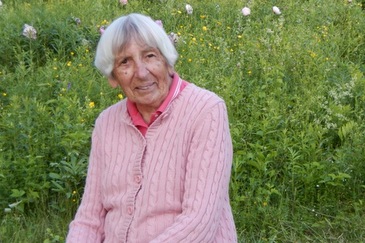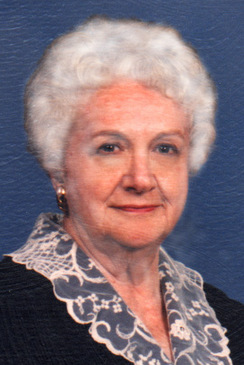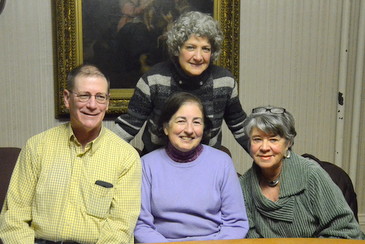Together with Alzheimer's
.JPG)
Trish Scott is in a period of transition. Her mother passed away last year after suffering for several years from Alzheimer’s disease. For much of that time, her mother lived with Trish, who became her primary caregiver despite the demands of a job as a physical therapist.
“The whole thing was quite an experience,” she says. “I remember falling asleep in a client’s driveway one day.”
Trish says those years were full of challenges, such as the time her mother decided she was unable to walk.
“She became immensely fearful of getting up on her feet. It didn’t matter how much help she got. Something went into her head that she could not do this and that she was going to fall, so there was a lot of angst and fear,” Trish recalls.
But, Trish says, there were also moments of sweetness and love, which she still treasures.
“I had a chance to sit with her on the day when she sat at the edge of the bed, and she was back in her 20s and was looking at an old picture of Dad in the Navy, ‘Oh, this guy is so cute. Isn’t he sweet?’ And she was kicking her feet like a little girl. It was adorable. You got a glimpse of what she was like before I ever came along. Those things are just priceless,” she says.
 While she was helping her mother through the final stages of her life, Trish joined “Together With Alzheimer's,” a support group offered through the Parish of the Holy Eucharist in Falmouth. She admits she initially only attended because of the invitation of a friend, Catherine Gentile, who started the group.
While she was helping her mother through the final stages of her life, Trish joined “Together With Alzheimer's,” a support group offered through the Parish of the Holy Eucharist in Falmouth. She admits she initially only attended because of the invitation of a friend, Catherine Gentile, who started the group.
“I initially thought, ‘This is the last thing I want to do,’” she says. “Mom gets up at two in the morning. I don’t have ten seconds for myself at all. Why in the name of everything would I want to go to a group and talk about it?’”
But after participating, her opinion dramatically changed.
“It turned out to be the best thing ever,” she says. “You end up coming out at the end feeling so much better. You don’t feel so alone.”
The support group began in March 2014. It evolved out of a series of discussions about caregiving that Catherine led at the parish.
“After the third workshop, nobody wanted to say goodbye, so we kept coming,” says Donna Forcier, whose mother is living with Alzheimer’s.
The group meets Wednesday evenings at Sacred Heart Church in Yarmouth, and once a month, Catherine arranges to have a guest speaker, someone with medical or legal expertise for example.
Anyone caring for a loved one with a chronic disease such as Alzheimer’s or Parkinson’s is invited. You don’t have to be a member of the parish to attend.
While other support groups exist in the area, members of “Together with Alzheimer’s” say they find comfort in having one that is parish-based.
“Anybody can come, but we have a somewhat different focus. I think, here, it’s much safer to talk about the grace in the situation, that there are blessings in it,” says Trish.
 Catherine started the group because she wanted to use her personal and work experiences to help others who were facing what she once did. Catherine’s mother, who lived in Connecticut, battled Alzheimer’s for 12 years, and Catherine, whose background was in special education and residential treatment, became both her mother’s caregiver and advocate.
Catherine started the group because she wanted to use her personal and work experiences to help others who were facing what she once did. Catherine’s mother, who lived in Connecticut, battled Alzheimer’s for 12 years, and Catherine, whose background was in special education and residential treatment, became both her mother’s caregiver and advocate.
“It took tremendous energy,” she says. “And, in having the background of an administrator in that residential facility, I knew what should happen for good treatment, and I was able to see good treatment, and I was able to see treatment that needed work.”
She says she wanted to be part of a movement for positive change in the quality of care Alzheimer’s patients receive.
“The underlying key, I think, to dealing with people Alzheimer’s is compassion. As with anything, I think if you have compassion, you’ve got the keys,” she says.
It led her to author a book entitled, The Quiet Roar of a Hummingbird, to write afree online newsletter "Together With Alzheimer's Ezine,” and to reach out to Father Daniel Greenleaf, pastor, about starting a parish program.
“He was wonderfully supportive. I mean, who says to you, ‘Whatever I can to do help?’” she says.
Although everyone’s situation is a little different, Catherine says there are similarities in what those dealing with Alzheimer’s experience.
“Initially, a person has real heartache, and they’re grieving for their own loss. Then, as the disease progresses, it’s the family that takes the burden,” she says.
Early on, there may be disagreements among family members about care, especially if some are still in denial about their loved one’s condition. New living arrangements may need to be found. The person’s behavior may begin to change.
Catherine recalls, for instance, becoming upset at things her mother would say to her.
“All those internal criticisms we have, we keep a screen on those, and an Alzheimer’s person doesn’t. It’s a brain disease. It removed that control, and it can be hurtful. So, we have husbands, wives, children who come in saying, ‘My mother did this. My wife did this. My husband did that.’ And first of all, it’s validating that what they’re feeling is so true. This is hurtful,” she says. “Having that experience, I try to bring people back, ‘Now you’ve vented. It’s out. It’s o.k. to have those feelings, but now what are you going to do about it?’ And if you have compassion, it allows you to put those things aside and in perspective and then move forward.”
Those with Alzheimer’s also sometimes experience “sundowning,” a condition in which they become agitated in the afternoon or evening. In some cases, they reverse their sleep cycle, which was the case with Ed LeBorgne’s mother, who passed away a year ago.

Catherine says, over time, you develop strategies for dealing with the issues that arise, something members of the support group share with one another.
“They have a nice little repertoire of stuff that worked or stuff that they would recommend staying away from. They have become very efficient at helping one another get through these things,” she says. “I bring new information. There is new information coming out all the time. People always have different ideas as to what to do. I try to keep my eye out for strategies. I bring them in and we talk about them.”
“It gives you reassurance that you’re on the right track,” says Trish.
“I got a lot of tips here, really from everybody,” says Ed.
“It’s comforting, really, to know there are people in the same boat as you and to share your thoughts and ideas. You can always pick up something,” says Donna. “Oftentimes, you find you had an experience yourself that you could share, and it’s enlightening for someone else.”
Donna, who makes frequent trips to upstate New York where her mother and brother live, says she appreciates not feeling pressured to attend meetings.
“If you can make it, you show up, and if you can’t, that’s OK. I try to make the meetings as much as I can as long as I’m in town,” she says.
Now that their mothers have died, Trish and Ed don’t attend the group as often as they once did, but they still return from time to time to offer support to others.
“I come back once a month or so just to touch base. I’m more interested now in keeping tabs on everyone else,” Ed says.
While neither Trish, Ed, nor Donna started off in search of a support group, they all say they are grateful they found “Together with Alzheimer’s.”
“Everyone has something that they bring to the table,” says Trish.
“There is always something to be learned from someone,” agrees Donna. “We’re true believers.”
For more information:
To learn more about the support group or to sign up for Catherine's free online newsletter "Together With Alzheimer's Ezine,” you can contact Catherine Gentile at [email protected] or 207.233.0709.
The support group meets on Wednesdays from 7 to 8 p.m. at Sacred Heart Parish Center, 326 Main Street in Yarmouth.










